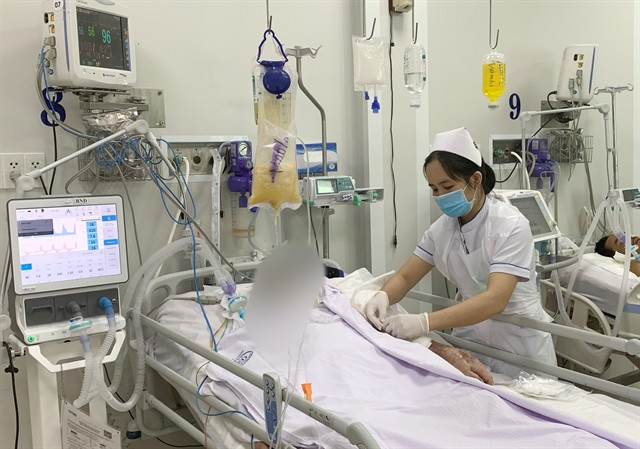 |
| A doctor of Chợ Rẫy Hospital treats a child with botulinum poisoning in HCM City. VNA/VNS Photo |
The patient passed away shortly after six vials of Botulism Antitoxin Heptavalent (BAT) antidote sent from the World Health Organization’s warehouse in Switzerland arrived in the city to treat six patients suffering from botulinum poisoning.
The man is one of six botulinum poisoning cases that have been treated at Chợ Rẫy Hospital, Gia Định People’s Hospital and Children No 2’s Hospital in the city.
The man died 10 days after he was hospitalised at Gia Định People’s Hospital on May 14.
Võ Hồng Minh Công, deputy director of Gia Định People’s Hospital, said the patient suffered from severe poisoning. The patient was diagnosed with type-A botulinum poisoning.
After being taken to hospital, he was ventilated and showed muscle weakness. He was first treated at the hospital’s Department of Neurology.
The patient then showed more severe complications and was transferred to the hospital’s Intensive Care Unit.
Despite doctors' efforts, the man suffered from multi-organ failure and died on Wednesday night.
Golden period passed
The hospital said at the time of the victim's death, the BAT antidote, provided by the World Health Organization (WHO), had already arrived at the hospital, but the patient had passed the prescribed time to take the drug.
Lê Quốc Hùng, head of the Tropical Diseases Department under Chợ Rẫy Hospital, said: “The antidote is the best option, but it must be used at the right time, used at the beginning of symptoms of weakness, to help neutralise toxins in the blood.”
If the patient is treated with the antidote as soon as toxins are detected, it is possible to come out of paralysis and it will not lead to the need for mechanical ventilation within 48 to 72 hours, he said.
However, the effectiveness of the antidote also depends on the amount of poison the patient ingested and whether the antidote is used at the right time, he added.
In the absence of an antidote, the toxins continue to attack the patient. Botulinum enters the nervous system causing conduction loss, the muscles cannot be controlled and cause paralysis, he said.
When respiratory muscles are paralysed, the patient will suffer from respiratory failure and die if not treated, he said.
MoH’s efforts
In an attempt to get the antidote for the six botulinum poisoning patients, Minister of Health Đào Hồng Lan and Deputy Minister of Health Đỗ Xuân Tuyên ordered the Drug Administration of Việt Nam to quickly work with relevant units of the WHO.
On the afternoon of May 23, Lan had a face-to-face meeting with the WHO’s office representatives in Hà Nội and asked for support in getting the medication.
Immediately, WHO decided to send the antidote for the patients, who were being treated at three hospitals in HCM City.
With the efforts of the ministry, the administration and the timely support of WHO, six vials of BAT antidote arrived in HCM City on Wednesday night.
Six botulinum poisoning cases
Since May 13, six cases of botulinum poisoning have been reported in HCM City’s Thủ Đức District.
All six patients had symptoms of fatigue, headache, dizziness, stomachache and diarrhoea, then began to have muscle weakness and difficulties swallowing.
Five of them were poisoned after eating bread with Vietnamese pork bologna (giò lụa) sold by street vendors while the other 45-year-old patient was hospitalised after eating fermented fish sauce.
Three children, who were hospitalised earlier, are now in stable condition after they were given the BAT antidote at HCM City's Children's Hospital 2.
Việt Nam had no BAT antidote left to treat the three other patients until the drugs arrived in the city on Wednesday night.
According to the Drug Administration of Việt Nam, botulinum poisoning stems from infection with the bacteria Clostridium botulinum. The cause is ingesting bacterial toxins in substandard and improperly preserved food.
Botulinum poisoning rarely occurs in Việt Nam and around the world, which leads to a scarcity of the required medication worldwide. Therefore, the supply of the BAT antidote is limited.
The cost of the BAT antidote is also very high. In Việt Nam, the BAT antidote is not listed among medicines covered by the health insurance fund.
Previously, the Health Office of Thủ Đức City said it had found the location of a pork bologna producer connected to the patients. The producer, located in Trường Thọ Ward, Thủ Đức City, has been operating for nearly two months without getting a licence from the authority. — VNS